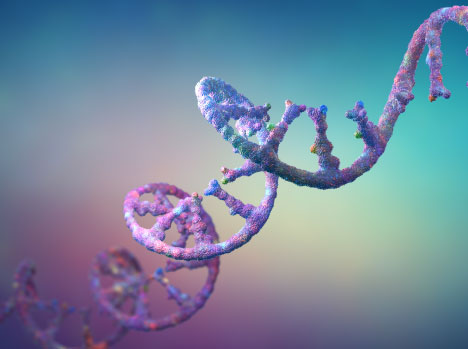Professors Katalin Kariko and Drew Weissman have been awarded the Nobel Prize in Physiology or Medicine for their pivotal role in developing mRNA technology, the cornerstone of revolutionary Covid vaccines. Their collaboration in the early 1990s at the University of Pennsylvania contributed significantly to the unprecedented speed of vaccine development during the global Covid-19 pandemic.

Image from The Nobel Prize
Unlike traditional vaccines, which use weakened or inactivated forms of pathogens, mRNA vaccines like Moderna and Pfizer/BioNTech leverage messenger ribonucleic acid (mRNA) to instruct cells in producing a viral protein. This innovative approach enables rapid adaptation to various diseases, demonstrated by ongoing research into mRNA technology for cancer treatment.
In a seminal 2005 study, Professors Kariko and Weissman uncovered that modifying mRNA bases could notably reduce inflammatory responses, a critical breakthrough years before the Covid-19 pandemic.1 Subsequent studies in 2008 and 2010 revealed that these base modifications not only suppressed inflammation but also significantly boosted protein production.2,3 This groundbreaking work paved the way for the clinical application of mRNA in therapies, highlighting the profound impact of their research on understanding and utilizing mRNA.
The Nobel Prize committee emphasized their instrumental role in addressing one of the greatest threats to human health in modern times, underscoring the significance of mRNA technology in vaccine development. Professors Kariko and Weissman’s groundbreaking work has left an indelible mark on the field of medicine, showcasing the potential for mRNA vaccines to revolutionize healthcare beyond the Covid-19 era.
The flexibility and speed of mRNA technology have not only transformed Covid-19 vaccination but also opened avenues for innovative treatments. mRNA Covid vaccines provide genetic instructions to the body, directing cells to produce a viral protein, prompting the immune system to recognize and combat foreign threats. This technology’s key advantage lies in its rapid adaptability, allowing swift vaccine development against various diseases. The flexibility extends to experimental cancer treatments, where abnormal proteins in a patient’s tumor are targeted with a personalized mRNA vaccine.
The success of mRNA Covid vaccines has prompted an increasing number of laboratories and pharmaceutical companies to focus on developing mRNA-related vaccines and therapies, holding promising potential for human health. Aligned with this momentum, PackGene remains committed to advancing mRNA vaccine and therapeutic research, providing outstanding services and products to contribute to ongoing progress in this groundbreaking field.

Check out our mRNA service to expedite your vaccine research
1. Karikó, K., Buckstein, M., Ni, H. and Weissman, D. Suppression of RNA Recognition by Toll-like Receptors: The impact of nucleoside modification and the evolutionary origin of RNA. Immunity 23, 165–175 (2005).
2. Karikó, K., Muramatsu, H., Welsh, F.A., Ludwig, J., Kato, H., Akira, S. and Weissman, D. Incorporation of pseudouridine into mRNA yields superior nonimmunogenic vector with increased translational capacity and biological stability. Mol Ther 16, 1833–1840 (2008).
3. Anderson, B.R., Muramatsu, H., Nallagatla, S.R., Bevilacqua, P.C., Sansing, L.H., Weissman, D. and Karikó, K. Incorporation of pseudouridine into mRNA enhances translation by diminishing PKR activation. Nucleic Acids Res. 38, 5884–5892 (2010).
PackGene is a CRO & CDMO technology company that specializes in packaging recombinant adeno-associated virus (rAAV) vectors. Since its establishment in 2014, PackGene has been a leader in the AAV vector CRO service field, providing tens of thousands of custom batches of AAV samples to customers in over 20 countries. PackGene offers a one-stop CMC solution for the early development, pre-clinical development, clinical trials, and drug approval of rAAV vector drugs for cell and gene therapy (CGT) companies that is fast, cost-effective, high-quality, and scalable. Additionally, the company provides compliant services for the GMP-scale production of AAVs and plasmids for pharmaceutical companies, utilizing five technology platforms, including the π-Alpha™ 293 cell AAV high-yield platform and the π-Omega™ plasmid high-yield platform. PackGene’s mission is to make gene therapy affordable and accelerate the launch of innovative gene drugs. The company aims to simplify the challenging aspects of gene therapy development and industrialization processes and provide stable, efficient, and economical rAAV Fast Services to accelerate gene and cell therapy development efforts from discovery phase to commercialization.
Related News
[2024/11/22] Gene and Cell Therapy- weekly digest from PackGene
FeaturedNewsArticlesPackGene's NewsletterReceive the latest news and insights to your inbox.About PackGenePackGene Biotech is a world-leading CRO and CDMO, excelling in AAV vectors, mRNA, plasmid DNA, and lentiviral vector solutions. Our comprehensive offerings span...
Novartis seeks more bolt-on deals as it purchases neuro startup for up to $1.1B
Novartis is buying gene therapy and neuroscience biotech Kate Therapeutics in a deal worth $1.1 billion in upfront and milestone payments, the Swiss pharma confirmed to Endpoints News on Thursday. And Novartis is not done yet. It is still on the lookout for bolt-on...
Genprex Signs Exclusive License to Additional Gene Therapy Technologies with the University of Michigan for the Treatment of Lung Cancer
License includes Genprex's Reqorsa® Gene Therapy in Combination with ALK-Inhibitors for the Potential Treatment of ALK-Positive Lung Cancer AUSTIN, Texas, Nov. 20, 2024 /PRNewswire/ -- Genprex, Inc. ("Genprex" or the "Company") (NASDAQ: GNPX), a clinical-stage...
Vyriad announces strategic collaboration with Novartis to develop in vivo CAR-T cell therapies
Collaboration will combine Vyriad's lentiviral vector platform and Novartis expertise and leadership in cell therapy innovation ROCHESTER, Minn., Nov. 20, 2024 /PRNewswire/ -- Vyriad, Inc., a clinical-stage biotechnology company developing the next generation of...
Related Services

Plasmids GMP Services
Multiple scales & grade of solutions of various kind of plasmids suitable for multiple treatments in a fast and cost effective way.
READ MORE

AAV GMP Services
Ranging from small-scale AAV production, to large-scale AAV cGMP manufacturing for animal studies.
READ MORE

Technology Platforms
PackGene’s proprietary π-Alpha™ 293 AAV High-yield Platform increases AAV production by 3 to 8 times that of traditional platforms.
READ MORE

